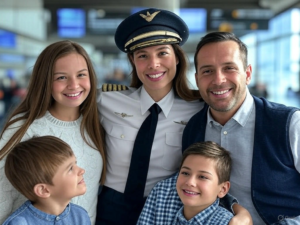Can I have kids and be a professional pilot? How does this career affect a family?
 Yes, you can have kids and be a professional pilot, but balancing a demanding aviation career with family life requires careful planning and flexibility.
Yes, you can have kids and be a professional pilot, but balancing a demanding aviation career with family life requires careful planning and flexibility.
One of the most significant challenges for pilots is the time spent away from home. Pilots often have travel days away from home, overnights in distant locations, and this can keep them away from their families for several days at a time. Even regional or domestic pilots may have irregular schedules that include nights, weekends, and holidays. This time away can impact family dynamics, making it essential to maximize quality time when at home.
Unlike a traditional 9-to-5 job, pilots often work irregular hours. Flights can depart or arrive at any time, which may require working during typical family activities or special events. Effective communication and scheduling can help manage these challenges, ensuring family members understand and can adjust to the variable schedule.
While pilots may have fewer days at home, they can often have more consecutive days off than those in traditional jobs. This time can be used to create meaningful experiences and maintain strong family bonds. Prioritizing quality time over quantity can help mitigate the impact of being away.
Having a strong support system is crucial. This includes a partner, family, or friends who can help manage household responsibilities and provide emotional support. Clear communication with your partner about roles, responsibilities, and expectations can help balance family and career demands. This can also come with costs. If securing childcare is something that has to be done through commercial services, there is a cost associated that needs to be budgeted.
A spouse is a critical part of the question of managing a professional pilot job, especially with children. When a spouse doesn’t work well with the career path it can go badly very quickly. Historically, professional pilots have faced higher divorce rates compared to other professions. The demanding nature of the job, including irregular hours, extended time away from home, and the high-stress environment, often strains personal relationships. Frequent absences and the inability to attend family events can create emotional distance and communication challenges. Additionally, the social lifestyle associated with the profession may contribute to marital strain. While these factors have historically contributed to higher divorce rates among pilots, individual experiences vary, and many pilots maintain successful marriages by prioritizing communication, mutual understanding, and quality time with their families. But that takes work and understanding. When it goes badly and the parameters of the career path are not understood from the beginning, it can result in very hard feelings and very expensive separations.
Reliable childcare and education arrangements are vital. Flexible childcare options that can accommodate your irregular schedule will reduce stress and ensure your children are well cared for in your absence. Involvement in your children’s education and extracurricular activities, even when not physically present, shows your commitment to their growth and development.
Taking time off from a flying career for a pregnancy or to take care of a new born child has effects on pay and seniority advancement. Traditionally more of a factor for female pilots, whoever becomes the primary stay-at-home parent for the first months or even years of a child’s life puts their career progression on hold for a bit. They give that up for the benefit of caring for their child. I can’t tell you that is good or bad, it is just a fact. Someone must do it, and there are career implications that result.
Modern technology allows pilots to stay connected with their families even when far away. Regular video calls, messages, and sharing daily experiences can help maintain closeness and involvement in family life.
Long-term career planning is essential. Some pilots choose to transition to positions with more predictable schedules, such as flight instructors or airline management roles, to achieve a better work-life balance as their family needs change.
Having kids and being a professional pilot is possible, but it requires careful management of time, communication, and support systems. The irregular and often demanding schedule of a pilot can impact family life, but with proactive planning and prioritizing quality time, pilots can successfully balance their careers and family responsibilities. Understanding these dynamics and making deliberate choices to foster family relationships can lead to a fulfilling career and a happy family life.

Comments
Can I have kids and be a professional pilot? How does this career affect a family? — No Comments
HTML tags allowed in your comment: <a href="" title=""> <abbr title=""> <acronym title=""> <b> <blockquote cite=""> <cite> <code> <del datetime=""> <em> <i> <q cite=""> <s> <strike> <strong>